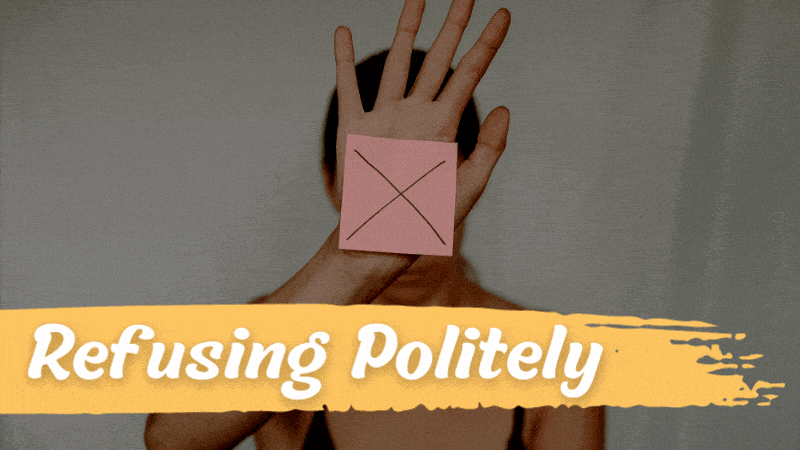Saying YES and NO is among the essential things in learning a new language. If you want to speak Serbian, you will have to say no sometimes, although this word may sound a bit negative! In this lesson, we will learn the most native ways how to say no in Serbian like a real pro. If that’s something you are interested in, let the learning begin!
Saying no is important in many languages, and there are many ways how to use it in everyday situations. The Serbian dictionary may give some clues, but the simple translation of the word may not suffice in all situations. Both pronunciation and non-verbal communication are important in the Serbian language, so let us learn both! All of this is being translated with a background meaning, so be sure to read the details below.
How To Say No In Serbian
The most straightforward word for NO is its literal translation: HE (in Cyrillic alphabet) / NE. However, there are many other words used to negate or refuse things. Bear with us in this course while we learn new forms of saying no!
By learning these foreign words, you will also be able to use them in neighboring Balkans countries such as Bosnia and Herzegovina, Montenegro, and Croatia. The Serbian dictionary may help you across Serbia, and these countries, where the meanings overlap and synonyms happen to be the same or similar. In ex-Yugoslavia, there was an official language called Serbo-Croatian precisely because of the similarity between these two languages. In the beginning, let us now learn phrases of no as Serbs use it!
Negative Phrases In Serbian
| English | Serbian | Serbian (Latin) |
| No | He | Ne |
| I don’t want to | Hећу | Neću |
| No, thank you | Не, хвала | Ne, hvala |
| I am not | Hисам | Nisam |
| I do not have | Hемам | Nemam |
| Don’t (do it) | Немој | Nemoj |
Using JOK
Very often, Serbs use the phrase JOK, which also means no. It stems from the Turkish word Yok with the same meaning. It can be used in many situations. It may have a sense of No, I am not, You did not, etc., like in this sentence: “Да ли су ту да донесу паметну одлуку? / Da li su tu da donesu pametnu odluku? ” (Translation: Are they here to make a wise decision), to which we can simply answer: Јок.
In a dialogue, JOK may be used to express lack of something. For example: “A: Има ли нешто ново?/Ima li nešto novo? B: Јок ” (A: Is there anything new? B: No).
Many phrases use Jok to negate things:
Ma jок / Ma jok – Whatever, it is out of the question, don’t even talk about it;
Али jок / Ali jok – None of it, it failed (about the action or what was assumed or expected);
Јок вала / Jok vala – Oh no, no I won’t
Refusing Politely

Serbs are very hospitable people. When entering a Serbian home, you would be welcomed with a sip of rakija (meaning brandy), sweets, and strong black coffee (which is named Serbian coffee, although it is practically the same as Bosnian, Turkish, or Greek coffee)! More sweets, more coffee, and what is particularly worrying for those who do not drink a lot of alcohol, more rakija will come soon after this welcome. Basically, in such a situation, it is necessary to refuse it politely, at least three times. Do not wait, as the person might talk you into having more!
To stay firm and resolute about your decision to refuse, you can simply say не могу / ne mogu, meaning I can’t. Repeating these words several times will probably do the trick, and the host will not have to guess if you are doing it because of politeness or because you lost your stamina!
If the person is persistent, you can stress it to sign your willingness: Ја стварно не могу / Ja stvarno ne mogu (meaning I really cannot). The last sentence would do the trick! As an alternative, you can say Не могу више, хвала / Ne mogu više, hvala (meaning I cannot anymore, thank you).
Non-Verbal Way Of Saying No In Serbian
While many words can help you understand or translate what Serbs are telling you, locals may also use some other ways to express no. A person may just nod their head left-right to express discomfort or disapproval. A person may nod a single time upwards and then downwards in some areas, which simply means no.
Usually, they would not speak anything, and no word would follow this gesture. You need to observe! For centuries, this is a habit inherited from neighboring peoples, such as Greeks and Turks with whom Serbia was in a single state – Ottoman Empire.
Negating Verbs In Serbian
With only a few exceptions, the Serbian language is simple in forming negations. You should simply position the word He/Ne in front of any given verb, followed by nouns. Let us see some very useful examples:
| English | Serbian | Serbian (LATIN) |
| I cannot | Hе могу | Ne mogu |
| I am not allowed | Hе смем | Ne smem |
| I don’t know | Не знам | Ne znam |
| I don’t have to | Hе морам | Ne moram |
| I don’t sell | Hе продајем | Ne prodajem |
| I don’t drive | Hе возим | Ne vozim |
| I don’t like it | Hе свиђа ми се | Ne sviđa mi se |
Conclusion
Saying NO in Serbian now looks much more fun than learning the simple HE/NE! Don’t worry if you sometimes go wrong – it is a good way to catch a phrase! Various words let you speak in line with the moment and improve your quality to speak Serbian.

Learning Serbian is now easy and fun with Simya Solutions‘ Ling App that intends to make language learning simple, enjoyable, and easily obtainable. Look into our Serbian dictionary, let your thoughts be translated, grasp the meaning of what your Serb friend wants to say in his own words! Whatever your interests, we can teach you how to speak, understand, and write the language enjoyably by using high-quality puzzles, games, challenges, and quizzes! It is far better and interesting than Google! Download it today!


































































